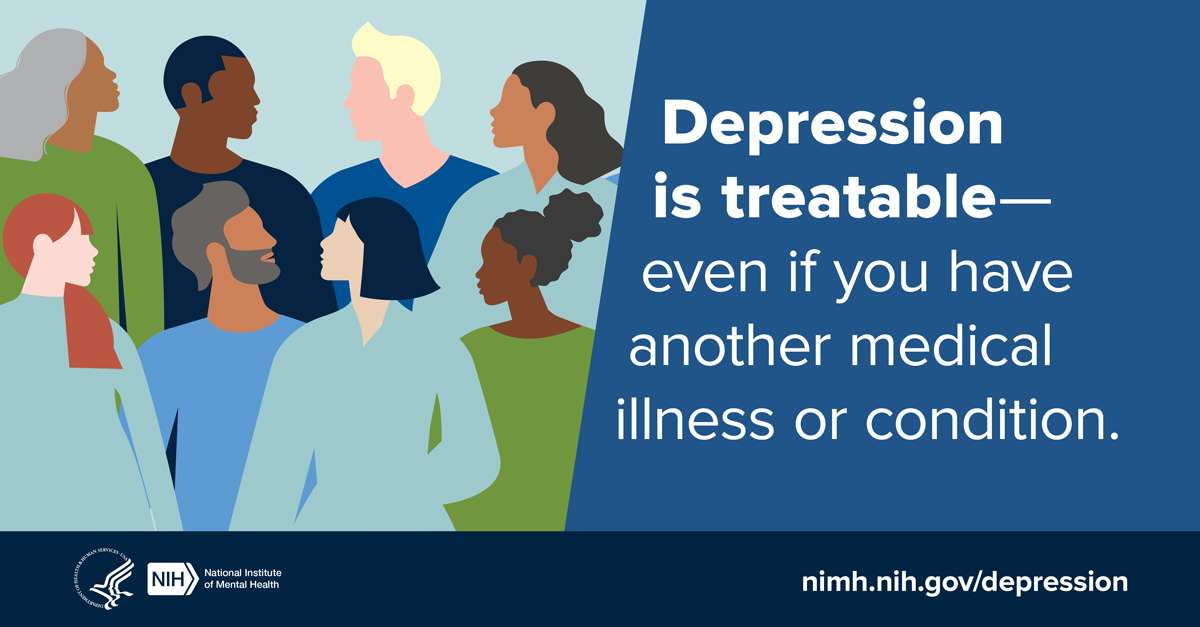Chronic Illness and Mental Health: Recognizing and Treating Depression
Chronic illnesses such as cancer, heart disease, or diabetes may make you more likely to have or develop a mental health condition.
It is common to feel sad or discouraged after having a heart attack, receiving a cancer diagnosis, or when trying to manage a chronic condition such as pain. You may be facing new limits on what you can do and may feel stressed or concerned about treatment outcomes and the future. It may be hard to adapt to a new reality and to cope with the changes and ongoing treatment that come with the diagnosis. Favorite activities, such as hiking or gardening, may be harder to do.
Temporary feelings of sadness are expected, but if these and other symptoms last longer than a couple of weeks, you may have depression. Depression affects your ability to carry on with daily life and to enjoy family, friends, work, and leisure. The health effects of depression go beyond mood: Depression is a serious medical illness with many symptoms, including physical ones. Some symptoms of depression include:
Remember: Depression is treatable—even if you have another medical illness or condition. For more information, visit the National Institute of Mental Health (NIMH) depression webpage . If you need help starting the conversation, check out NIMH’s Tips for Talking With Your Health Care Provider .
People with other chronic medical conditions are at higher risk of depression.
The same factors that increase the risk of depression in otherwise healthy people also raise the risk in people with other medical illnesses, particularly if those illnesses are chronic (long-lasting or persistent). These risk factors include a personal or family history of depression or family members who have died by suicide.
However, some risk factors for depression are directly related to having another illness. For example, conditions such as Parkinson’s disease and stroke cause changes in the brain. In some cases, these changes may have a direct role in depression. Illness-related anxiety and stress also can trigger symptoms of depression.
Depression is common among people who have chronic illnesses such as:
- Alzheimer’s disease
- Autoimmune diseases, including systemic lupus erythematosus, rheumatoid arthritis, and psoriasis
- Cancer
- Coronary heart disease
- Diabetes
- Epilepsy
- HIV/AIDS
- Hypothyroidism
- Multiple sclerosis
- Parkinson’s disease
- Stroke
Some people may experience symptoms of depression after being diagnosed with a medical illness. Those symptoms may decrease as they adjust to or treat the other condition. Certain medications used to treat the illness also can trigger depression.
Research suggests that people who have depression and another medical illness tend to have more severe symptoms of both illnesses. They may have more difficulty adapting to their medical condition, and they may have higher medical costs than those who do not have both depression and a medical illness. Symptoms of depression may continue even as a person’s physical health improves.
A collaborative care approach that includes both mental and physical health care can improve overall health. Research has shown that treating depression and chronic illness together can help people better manage both their depression and their chronic disease.
Children and Adolescents With Chronic Illnesses
Children and adolescents with chronic illnesses often face more challenges than their healthy peers in navigating adolescence. Chronic illnesses can affect physical, cognitive, social, and emotional development, and they can take a toll on parents and siblings. These limitations put children and adolescents at higher risk than their healthy peers of developing a mental illness.
Children and adolescents with chronic illnesses experience many forms of stress. Parents and health care providers should be on the lookout for signs of depression, anxiety, and adjustment disorders (a group of conditions that can occur when someone has difficulty coping with a stressful life event) in young people and their families.
People with depression are at higher risk for other medical conditions.
It may come as no surprise that adults with a medical illness are more likely to experience depression. The reverse is also true: People of all ages with depression are at higher risk of developing certain physical illnesses.
People with depression have an increased risk of cardiovascular disease, diabetes, stroke, pain, and Alzheimer’s disease, for example. Research also suggests that people with depression may be at higher risk for osteoporosis. The reasons are not yet clear. One factor with some of these illnesses is that many people with depression may have less access to good medical care. They may have a more challenging time caring for their health—for example, seeking care, taking prescribed medication, eating well, and exercising.
Scientists also are exploring whether physiological changes seen in depression may play a role in increasing the risk of physical illness. In people with depression, scientists have found changes in the way several different systems in the body function that could have an impact on physical health, including:
- Increased inflammation
- Changes in the control of heart rate and blood circulation
- Abnormalities in stress hormones
- Metabolic changes such as those seen in people at risk for diabetes
There is some evidence that these changes, seen in depression, may raise the risk of other medical illnesses. It also is clear that depression has a negative effect on mental health and everyday life.
Depression is treatable even when another illness is present.
Depression is a common complication of chronic illness, but it does not have to be a normal part of having a chronic illness. Effective treatment for depression is available and can help even if you have another medical illness or condition.
If you or a loved one think you have depression, it is important to tell your health care provider and explore treatment options. You also should inform your health care provider about all your current treatments or medications for your chronic illness or depression (including prescribed medications and dietary supplements). Sharing information can help avoid problems with multiple medicines interfering with each other. It also helps your health care provider stay informed about your overall health and treatment issues.
Recovery from depression takes time, but treatment can improve your quality of life even if you have a medical illness.
Treating depression with medication, psychotherapy (also called “talk therapy”), or a combination of the two also may help improve the physical symptoms of a chronic illness or reduce the risk of future problems. Likewise, treating the chronic illness and getting symptoms under control can help improve symptoms of depression.
Depression affects each individual differently. There is no “one-size-fits-all” for treatment. It may take some trial and error to find the treatment that works best. You can learn more about the different types of depression treatment—including psychotherapy, medication, and brain stimulation therapies—on NIMH’s depression webpage. Visit the Food and Drug Administration (FDA) website for the latest information on medication approvals, warnings, and patient information guides.
Participating in Clinical Research
Clinical trials are research studies that look at new ways to prevent, detect, or treat diseases and conditions. Although individuals may benefit from being part of a clinical trial, participants should be aware that the primary purpose of a clinical trial is to gain new scientific knowledge so others may receive better help in the future.
Researchers at NIMH and around the country conduct many studies with patients and healthy volunteers. Talk to your health care provider about clinical trials, their benefits and risks, and whether one is right for you. For more information, visit NIMH’s clinical trials webpage.
Finding Help
Behavioral Health Treatment Services Locator
The Substance Abuse and Mental Health Services Administration (SAMHSA) provides the Behavioral Health Treatment Services Locator, an online resource for locating mental health treatment facilities and programs in your state. For additional resources, visit NIMH’s Help for Mental Illnesses webpage.
Talking to Your Health Care Provider About Your Mental Health
Communicating well with your doctor or health care provider can improve your care and help you both make good choices about your health. Read NIMH’s Tips for Talking With Your Health Care Provider to help prepare for and get the most out of your visit. For additional resources, including questions to ask your doctor, visit the Agency for Healthcare Research and Quality website.
If you or someone you know is in immediate distress or is thinking about hurting themselves, call the National Suicide Prevention Lifeline toll-free at 1-800-273-TALK (8255). You also can text the Crisis Text Line (HELLO to 741741) or use the Lifeline Chat on the National Suicide Prevention Lifeline website.
Reprints
This publication is in the public domain and may be reproduced or copied without permission from NIMH. Citation of NIMH as a source is appreciated. To learn more about using NIMH publications, please contact the NIMH Information Resource Center at 1-866-615-6464, email [email protected], or refer to NIMH’s reprint guidelines.
For More Information
MedlinePlus (National Library of Medicine) (en español)
ClinicalTrials.gov (en español)
U.S. Department of Health and Human Services
National Institutes of Health
NIH Publication No. 21-MH-8015
Revised 2021
What is a chronic illness/disease?
A condition that requires medical attention and/or restricts a person’s life daily and lasts at least one year is considered a chronic illness/disease.1 The most common of these in the United States include but are not limited to heart disease, stroke, diabetes, and cancer. Out of all the health conditions in the United States, chronic illnesses/diseases are the most prevalent, costly, and responsible for seven out of ten deaths in the United States. 2
Chronic illnesses/diseases can be a result of risk factors such as age, family history, substance use, poor eating habits, environmental status, and more.3
Chronic illnesses/diseases include:
• Alzheimer’s
• Arthritis
• Cancer
• Chronic Kidney Disease
• Cystic Fibrosis
• Dementia
• Diabetes
• Fibromyalgia
• Heart Disease
• Lou Gehrig’s Disease (ALS)
• Lung Conditions
• Obesity
• Osteoporosis
• Parkinson’s
• Stroke
• Traumatic Brain Injury
What does chronic illness/disease have to do with anxiety and depression?
Because of the nature of chronic illnesses/diseases, whether it be increased hospitalization, excessive worry, or hormonal changes, having a chronic illness/disease increases the likelihood of developing a mental illness. 4
According to the Centers for Disease Control and Prevention (CDC), Major Depressive Disorder (MDD) is prevalent in 51% of Parkinson’s patients, 42% of cancer patients, 27% of Diabetes patients, 23% of cerebrovascular patients, 17% of cardiovascular patients, and 11% of Alzheimer’s patients.5 Not only does chronic illness/disease increase the chances of having a mental illness, but people experiencing depression are more likely to have other medical conditions.6
For those with chronic illness/disease(s), if you think you have anxiety and/or depression, it is important to contact your primary health provider for details on diagnosing and treatment.
If your child has a chronic illness, they are likely encountering more challenges physically, socially, emotionally, and cognitively than their peers. Like adults, children with chronic illnesses may have anxiety, depression, or a related disorder. Parents should be mindful of this and contact their child’s health care provider if they notice any signs of depression, anxiety, or a related disorder.7
Financial Assistance: Learn how you can get help paying for your chronic disease copays
- HealthWell Foundation is a national non-profit organization that provides financial assistance to insured Americans living with chronic or life-altering conditions.
- CancerCare – helps people with cancer overcome financial access and treatment barriers by assisting them with co-payments for their prescribed treatments..
- NeedyMeds – connects people to programs that will help them afford their medications and other healthcare costs.
ADAA Resources:
Chronic Illness/Disease - General
Fibromyalgia
- Fibromyalgia - Webpage
Older Adults and Dementia
Heart Disease
Obesity
Resources &Trending Articles:
References:
1 National Center for Chronic Disease Prevention and Health Promotion (NCCDPHP). (2021, April 28). About Chronic Diseases. Centers for Disease Control and Prevention. https://www.cdc.gov/chronicdisease/about/index.htm
2 Raghupathi, W., & Raghupathi, V. (2018). An Empirical Study of Chronic Diseases in the United States: A Visual Analytics Approach. International journal of environmental research and public health, 15(3), 431. https://doi.org/10.3390/ijerph15030431
3 Centers for Disease Control and Prevention. (2012, October). Mental Health and Chronic Diseases[Infographic]. https://www.cdc.gov/workplacehealthpromotion/tools-resources/pdfs/ issue-brief-no-2-mental-health-and-chronic-disease.pdf
4 Mental Health America. (n.d.). Infographic: Chronic Health Conditions And Mental Health. https://mhanational.org/infographic-chronic-health-conditions-and-mental-health
5 Centers for Disease Control and Prevention. (2012, October). Mental Health and Chronic Diseases[Infographic]. https://www.cdc.gov/workplacehealthpromotion/tools-resources/pdfs/issue-brief-no-2-mental-health-and-chronic-disease.pdf
6 U.S. Department of Health and Human Services. (2021). Chronic Illness and Mental Health Recognizing and Treating Depression[Infographic]. https://www.nimh.nih.gov/health/publications/chronic-illness-mental-health/21-mh-8015-chronicillness-mentalhealth_151898.pdf
7U.S Department of Health and Human Services. (2021). Chronic Illness and Mental Health Recognizing and Treating Depression[Infographic]. https://www.nimh.nih.gov/health/publications/chronic-illness-mental-health/21-mh-8015-chronicillness-mentalhealth_151898.pdf
The content of this page was published in July, 2021.




